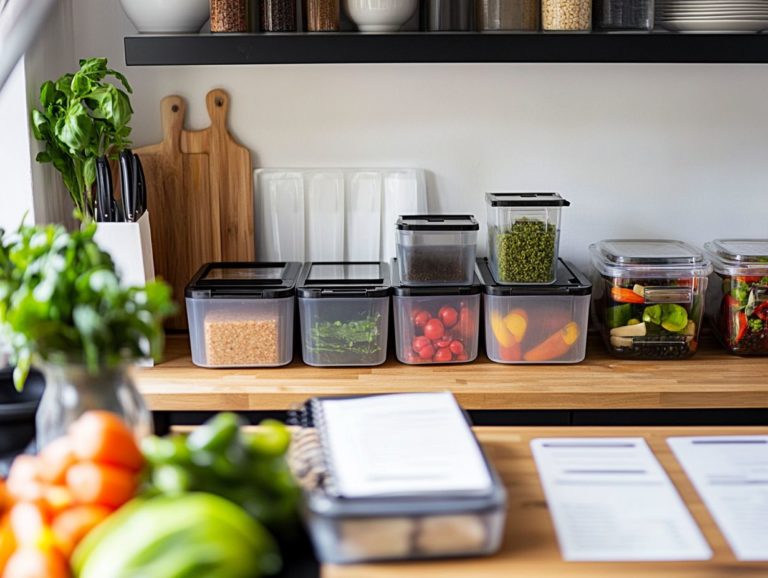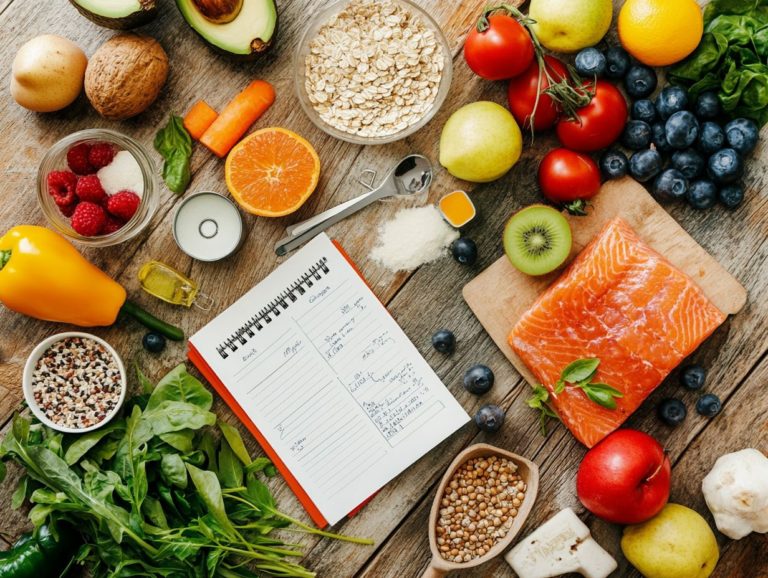The Best Time to Meal Plan for the Week
Are you ready to transform your week with meal planning? Meal planning can truly change how you manage your time and budget effectively.
By strategically selecting when to plan your meals, you can establish a routine tailored to your personal schedule while taking advantage of seasonal ingredients.
This article delves into the benefits of meal planning, provides tips for effective organization and nutrition, and discusses how to maintain flexibility when unexpected changes arise.
Discover how to integrate meal planning seamlessly into your week!
Contents
Key Takeaways:

- Meal planning saves time and money by eliminating last-minute grocery trips and reducing food waste.
- Consider your personal schedule and the availability of seasonal ingredients when choosing the best time to meal plan.
- Assess your needs and preferences to determine the most convenient time for meal planning while incorporating organization and flexibility for successful results.
Benefits of Meal Planning
Meal planning presents a wealth of advantages that can elevate your cooking routine and refine your overall dining experience. By thoughtfully organizing your meals, you not only make meal prep easier but also drastically reduce food waste and grocery expenses.
This approach empowers you to integrate healthier options into your diet while managing your budget with precision, perfectly aligning with your dietary goals and preferences. When you plan your meals in advance, you significantly reduce the temptation to resort to unhealthy, last-minute dinner choices, paving the way for a more balanced lifestyle.
Time and Money Savings
Meal planning plays a vital role in saving both time and money by streamlining your grocery shopping and reducing food waste.
By creating a detailed meal planning list, you can make planned trips to the grocery store that minimize unnecessary purchases and help eliminate those pesky impulse buys.
Using meal prep containers allows for efficient storage and portion control, making it easy to grab meals on your busiest days. Practicing batch cooking empowers you to prepare larger quantities of meals in advance, saving you precious time during the week.
These strategies not only enhance your food management skills but also ensure that ingredients are used up before they spoil, resulting in a more organized kitchen.
Factors to Consider When Choosing a Meal Planning Time
When choosing the ideal moment for meal planning, consider several factors, such as your personal schedule, the seasonal availability of ingredients, and your unique cooking preferences.
By understanding your weekly routine, you can incorporate meal planning into your life, ensuring you allocate sufficient time for grocery shopping and ingredient preparation.
Using seasonal produce makes your meals fresher and often cheaper, ultimately enriching your meal planning experience.
Personal Schedule and Routine
Your personal schedule is pivotal in shaping the success of your meal planning, as it dictates the time you can allocate to cooking and preparation each week.
By understanding your daily commitments, you can identify the perfect meal prep days, ensuring that your culinary efforts align seamlessly with your busiest periods. For instance, if your weekdays are full of work and family responsibilities, dedicating a couple of hours on a Sunday can be transformative.
Incorporating quick meal options like stir-fries or sheet-pan dinners can significantly cut down on your kitchen time. Exploring five-ingredient recipes or using pre-chopped vegetables can simplify the process, enabling you to prepare nutritious meals even on the most chaotic days.
Seasonal Availability of Ingredients

Incorporating seasonal availability of ingredients into your meal planning elevates the quality and flavor of your dishes while keeping your budget intact.
When you choose seasonal produce, you unlock ingredients at their peak freshness and flavor. This significantly enhances the taste of your meals. Picture ripe tomatoes and fragrant basil in summer, ideal for vibrant salads and rich sauces. As winter rolls in, hearty root vegetables like carrots and parsnips become your go-to for roasting.
These fresh ingredients lend themselves beautifully to simple cooking techniques like grilling, steaming, or saut ing. These methods help preserve their natural flavors. Embrace seasonal ingredients now for vibrant, delicious meals!
How to Choose the Best Time for Meal Planning
Select the optimal moment for meal planning by assessing your needs and preferences. This ensures that your approach integrates seamlessly with your lifestyle and cooking skills.
Start by determining the types of meals you wish to prepare. Consider using meal prep containers, and gauge your readiness to cook in advance or batch cook for the week ahead. Batch cooking means preparing large quantities of meals at once to save time.
Assessing Your Needs and Preferences
Assessing your needs and preferences is crucial for tailoring your meal planning strategy. This ensures it suits your lifestyle and dietary goals.
Understand your dietary restrictions and preferred cooking techniques to streamline your weekly planning. This ensures each meal is both delightful and nourishing. Whether you’re steering clear of gluten, managing portion sizes, or favoring quick cooking methods, recognizing these factors empowers you to create meal ideas that resonate with your tastes.
Begin by listing ingredients you love and those you want to avoid. This lays the groundwork for your meal planning. Exploring various cuisines introduces exciting flavors while aligning with your dietary needs.
The secret lies in harmonizing creativity with practicality. This results in delicious meals that satisfy both your palate and health goals.
Tips for Successful Meal Planning
Successful meal planning relies on effective organization and preparation strategies. Doing so maximizes the nutritional value of your meals while simplifying the cooking process.
Organization and Preparation Strategies
Organizational strategies are essential for success in meal prep. They ensure a smooth cooking experience and efficient ingredient preparation.
Create a seamless process by sorting your ingredients based on type and usage. This allows quick access when it’s time to cook. Using labeled meal prep containers can improve organization, making it easy to identify portions and minimize food waste.
Establish a prep day schedule to prioritize what needs to be done in advance. This transforms cooking into a more enjoyable adventure. These strategies streamline the cooking process while igniting culinary creativity, inspiring innovative meal ideas and promoting healthier eating habits.
Maximizing Nutritional Value

To truly maximize the nutritional value of your meals, it’s essential to weave a tapestry of diverse, healthy dishes and effective cooking techniques into your meal planning. This involves selecting ingredients packed with nutrients, such as whole grains, lean proteins, and seasonal vegetables. These not only elevate flavor but also provide vital vitamins and minerals.
When preparing these meals, consider using cooking methods like steaming, roasting, or saut ing to retain nutrients that might otherwise be lost through boiling or deep-frying. Imagine enjoying a quinoa salad brimming with chickpeas and vibrant bell peppers a delightful dish that sings with color and nutrition.
For snacks, think of hummus paired with crisp carrot sticks or Greek yogurt adorned with mixed berries; both are excellent sources of protein and fiber. By ensuring your meals are well-rounded with protein sources and an array of colorful vegetables, you can craft a nutritional powerhouse right on your plate.
Incorporating Flexibility in Meal Planning
Incorporating flexibility into your meal planning is key to adapting to changes in your personal circumstances or unexpected events. This approach makes meal planning effective and fun, allowing you to navigate life s surprises with ease.
Adapting to Changes and Unexpected Events
Adapting to changes and unexpected events demands a proactive approach to meal planning. By having emergency meal prep ideas at your fingertips, you can transform how you tackle hectic schedules. Utilizing frozen vegetables not only enhances convenience but also ensures that essential nutrients are always within reach, making it effortless to whip up nutritious meals in mere minutes.
Embracing simple recipes that require minimal time and effort can serve as reliable go-tos, reducing the stress of last-minute cooking. This kind of flexibility alleviates pressure and nurtures a more sustainable meal planning lifestyle, allowing healthy eating to seamlessly integrate into your daily routine.
Frequently Asked Questions
What is the best day to meal plan for the week?
The best day to meal plan for the week is typically Sunday. This allows you to start the week off on the right foot with all your meals prepared, especially when you follow the ultimate guide to weekly meal planning for inspiration.
Why is Sunday the best day to meal plan?

Sunday is considered the best day to meal plan because it is usually when people have more free time, allowing you to focus on planning and preparing your meals without feeling rushed or stressed.
Is it necessary to meal plan for the entire week?
No, it is not necessary to meal plan for the entire week. Some people prefer to plan for just a few days, while others like to plan for the entire week. It ultimately depends on your personal preference and schedule.
What are the benefits of meal planning for the week?
Meal planning for the week has several benefits, including saving time and money, reducing food waste, and promoting healthier eating habits. It also helps to reduce stress and make weeknight dinners more manageable.
Can I change my meal plan during the week?
Yes, you can always make changes to your meal plan during the week. Life can be unpredictable, so it’s okay to adjust as needed. Just make sure to have a backup plan in case things don t go as expected.
Do I need to follow my meal plan exactly?
No, you do not need to follow your meal plan exactly. If you feel like switching up a meal or trying something new, go for it! The meal plan is meant to be a helpful tool, not a strict rulebook.
Why not give meal planning a try this week for more ease and nutrition? It could transform your approach to healthy eating!






